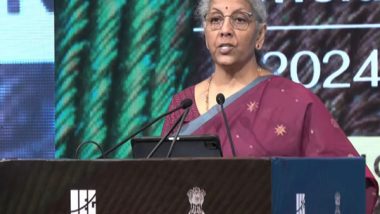New Delhi [India], October 4 (ANI): Speaking at the Kautilya Economic Conclave, Union Finance Minister highlighted the government's commitment to reduce fiscal deficit, from 5.6 per cent of GDP in FY24 to 4.9 per cent in FY25. She emphasised that with enhanced revenue collections, the government is confident of maintaining the fiscal discipline.
"Aided by buoyant revenue generation, restrained revenue expenditure growth and healthy economic activity, the fiscal deficit is estimated to decline further from 5.6 per cent of GDP in FY24 (provisional actuals) to 4.9 per cent in FY25," she said.
The quality of government expenditure has seen significant improvements, with a focus on capital outlays. The Finance Minister announced a 17.1 per cent increase in capital expenditure for FY25, reaching USD 11.1 lakh crore, or 3.4 per cent of GDP.
She said, "A larger proportion of fiscal deficit is now accounted for by capital outlays, indicating an increasingly investment-oriented deficit financing."
"The decline in commodity prices has facilitated the lowering of the budgeted allocation for subsidies on fertiliser and fuel. This has contributed to restraining the growth in revenue expenditure, which is estimated to increase by 6.2 per cent YoY," she added.
Falling commodity prices have also allowed for a reduction in subsidies for fertiliser and fuel, contributing to restrained revenue expenditure growth, which is estimated to rise by 6.2 per cent year-on-year.
The Finance Minister underscored the importance of infrastructure reforms, particularly in expanding national highways.
She said, "Infrastructure reforms over the past decade have expanded the national highways, increasing by 1.6 times from 2014 to 2024."
"The Bharatmala Pariyojana has significantly expanded the national highway network, increasing the length of high-speed corridors by 12 times and 4-lane roads by 2.6 times between 2014 and 2024. Today, 11.7 km of NH roads are laid on average per day, which is three times more than what was the case in FY14," she added.
The government has implemented and sustained reforms across various sectors, including infrastructure, banking, trade policy, and investment, ensuring policy continuity that drives long-term growth. (ANI)
(This is an unedited and auto-generated story from Syndicated News feed, LatestLY Staff may not have modified or edited the content body)













 Quickly
Quickly

















